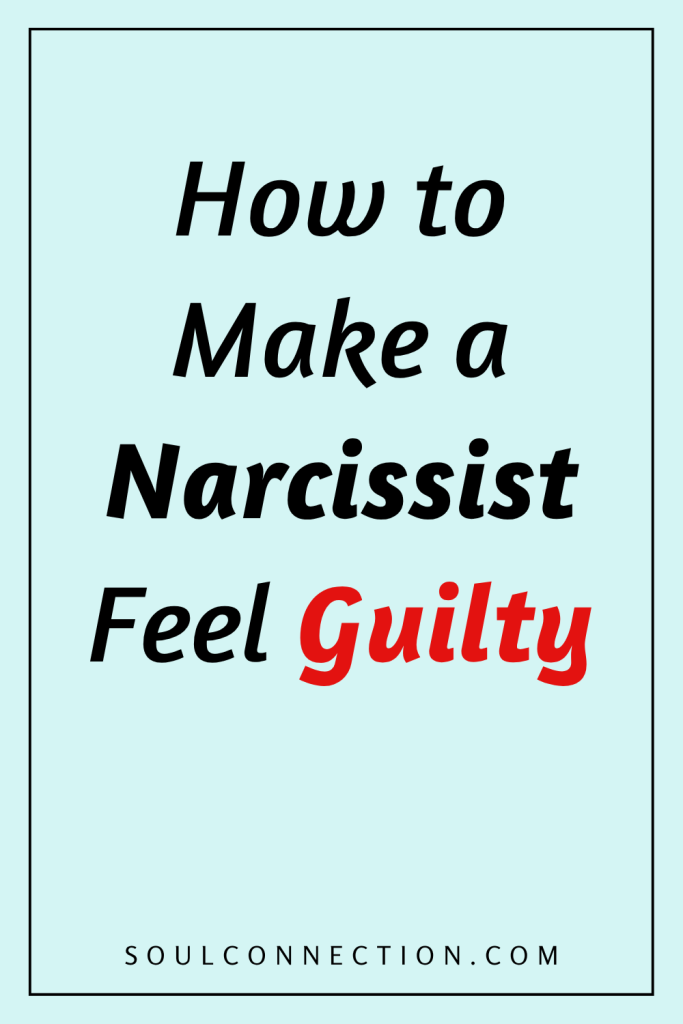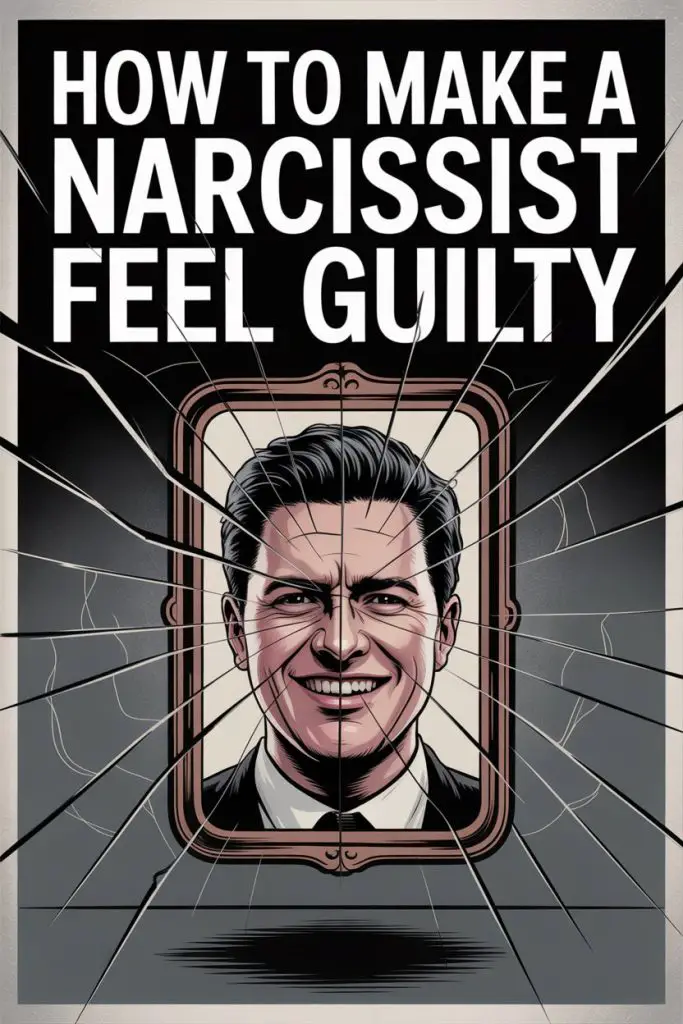Ever tried to make a narcissist feel guilty? It’s a bit like entering a staring contest with a goldfish: one of you has no idea what’s going on, and the other is just hoping for a miracle.
Guilt is unfamiliar territory for narcissists—like empathy, vegetables, or sharing the spotlight. That said, there are ways to plant just enough doubt in their self-contained universe to nudge them toward accountability.
If you’re ready to tango with a world-class blame-shifter, grab a cuppa and keep reading.
Understanding the Narcissistic Playbook
Narcissists aren’t born with a user’s manual, but if they were, “Never Accept Blame” would be printed in bold on page one. They’ve mastered the art of deflection, denial, and rewriting history faster than you can say, “I never said that.”
Guilt, as most people experience it, tends to bounce right off their armor.
Why? Because guilt requires self-reflection. It needs the ability to step back and see another person’s perspective. For narcissists, that’s about as likely as seeing a cat do your taxes.
But, and here’s the catch, narcissists are not immune to feeling bad—especially when their image, reputation, or supply of admiration is threatened.
Speak Their Language
Forget heartfelt emotional appeals. If you want to poke the guilt bear (gently), frame your words around things narcissists actually care about.
Public image, admiration, control—these are the currencies they trade in.
Try statements like, “People were really surprised by how you acted,” or, “I’m worried this will affect how others see you.” It’s not noble, but it works.
Narcissists are much more likely to reconsider their actions if they sense their carefully curated facade is cracking.
Set Boundaries That Actually Bite
Boundaries aren’t just self-help buzzwords—they’re essential when wrestling with a narcissist. Announce your lines in the sand with clarity and confidence, then (here’s the hard bit) actually enforce them.
When a narcissist realizes their behavior has real consequences, it can trigger a sense of loss or even a sliver of regret.
Actions speak louder than words. If you always forgive and forget, they’ll never feel the sting of guilt. Stand firm. Cancel plans. Take back your time and attention.
The sudden withdrawal of your energy can leave a bigger dent than a thousand guilt-trips ever could.
Mirror Their Behavior
This one’s a classic for a reason. Gently reflect their actions back at them—without sarcasm, just matter-of-factly. If they ignore your calls or bail on plans, do the same next time.
When they ask why, point out that you’re just following their lead.
Nothing brings out a narcissist’s self-pity quite like a taste of their own medicine. It’s not about playing games, but showing them (in high definition) how their behavior feels from the receiving end.
Sometimes, that’s the only way the penny drops.
Use “I” Statements—but with a Twist
Traditional advice says to use “I feel” statements. With narcissists, add a little spice: tie your feelings to consequences they can’t ignore.
Try, “I felt hurt when you dismissed my ideas, and it’s making me reconsider sharing important things with you.” Not only are you expressing your feelings, but you’re also highlighting what they stand to lose—a rare commodity in their world.
Resist the Urge to Over-Explain
Save your breath. The more you justify, explain, and plead, the more ammunition you hand over for the next round of manipulation. Keep your explanations short and sweet.
If they try to spin things or blame you, stay calm and repeat your point. Like a broken record, but with better boundaries.
Enlist the Power of Silence
Few things unsettle a narcissist like a strategic pause. Refuse to engage in circular arguments or dramatic confrontations. If you’re met with blame-shifting or gaslighting, respond with silence.
No emotional reactions, no fuming monologues—just quiet.
This isn’t about the cold shoulder. It’s about breaking the pattern. When they can’t get a rise out of you, the thrill is gone, and they’re left alone with their actions. Sometimes, that’s the only echo loud enough to rattle their conscience.
Appeal to Their Self-Interest
Narcissists are more likely to change—or at least pretend to—if something affects their own wellbeing. If their behavior is damaging their reputation, their job, or their valuables (like, say, their car or their new sneakers), highlight those consequences.
Phrase it like, “When you treat people this way, it tends to come back around. You could lose out on opportunities.” It’s not Shakespearean guilt, but it’s a start.
Avoid Public Showdowns
Tempting as it is to call out a narcissist in front of friends or family, it usually backfires. Public embarrassment sends them into overdrive: more lies, more rage, more denial.
For actual guilt to bubble up, keep things private. A one-on-one conversation is less threatening and more likely to stick.
Don’t Confuse Guilt with Shame
A quick PSA: guilt is about “I did something bad.” Shame is about “I am bad.” Push too hard, and a narcissist’s brittle ego tips from guilt into full-blown shame, and that’s when the fireworks start.
The goal isn’t to destroy them, just to nudge their moral compass a few degrees in your direction. Aim for accountability, not annihilation.
Know When to Call It Quits
Sometimes, the only thing guilt trips accomplish is giving you a headache. If you’ve tried everything and the narcissist still won’t budge, it’s okay to shift your energy elsewhere.
Protecting your peace is more important than winning the world’s hardest emotional wrestling match.
If you can’t get through, consider outside support—a therapist, a support group, or a very large tub of ice cream. There’s no shame in waving the white flag when you’re up against a professional gaslighter.
Compassion, Not Martyrdom
It’s easy to lose your sense of self when you’re in the orbit of a narcissist. Remember: your feelings are valid, your boundaries matter, and your time is precious.
Compassion for the narcissist shouldn’t come at the expense of self-respect.
Making a narcissist feel guilty isn’t about playing puppet master. It’s about restoring a little balance in the relationship, and reminding yourself that, no, you’re not crazy.
When Guilt Works and When It Doesn’t
Sometimes, a narcissist will genuinely feel a flicker of guilt. Maybe they’ll apologize (in their own way), or even change—for a while. Or maybe not.
The important thing is to recognize the difference between real growth and a temporary performance. Actions, not words, will tell you which is which.
Trying to force guilt where none exists is a losing game. Focus on your own boundaries and wellbeing, and any guilt the narcissist feels is icing on the cake.
Guilt Trips Are Not a Long-Term Solution
Sure, orchestrating a bit of guilt can offer a fleeting victory, but it won’t fix the underlying issues. Narcissists don’t wake up one day and miraculously sprout empathy.
Sustainable change comes from consistent boundaries, clear communication, and—if you’re lucky—a willingness on their part to seek help.
Expecting a Hollywood-style redemption arc is setting yourself up for heartbreak (and maybe a bill for broken crockery).
When Enough Is Enough
Trying to make a narcissist feel guilty is a bit like teaching a goldfish algebra. Every now and then, one might surprise you, but don’t hold your breath.
Your efforts are not wasted if they lead you to a place where you value your own needs just as much as anyone else’s. Sometimes, the best way to “win” with a narcissist isn’t by making them feel guilty, but by refusing to play their game at all.
Here’s to healthier connections, firmer boundaries, and the knowledge that you’re not alone in the great narcissist guilt experiment.
And if all else fails, there’s always chocolate and a good friend on speed dial.


